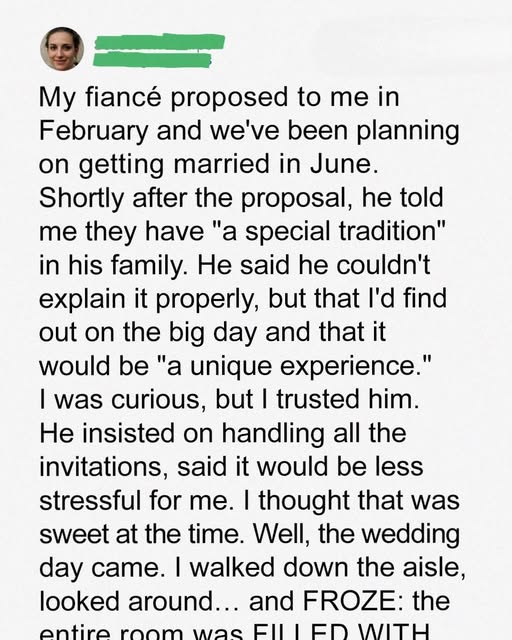On the morning of the wedding, the sky was clear, her gown fit perfectly, and she felt the familiar rush of hope she’d clung to since the engagement. She stepped out of the bridal car and walked toward the church doors, ready to meet her future.
The moment she crossed the threshold, everything inside her flipped.
The church was full — but not with the faces she expected. Every pew on both sides was filled with men. Not a single woman. Not her mother, not her sister, not her best friends, not Luke’s cousins, not even his own mother. The room was a sea of stern jackets, stiff collars, and politely expectant male faces.
Her father stood near the front, looking uncomfortable but attempting a supportive smile. Luke was at the altar, hands clasped, grinning like this was exactly how a wedding should look.
Hannah’s breath caught. She scanned the room, waiting for someone to explain what she was seeing.
Luke’s father approached her with a calm, almost rehearsed expression. “Welcome, Hannah,” he said warmly. “This is our family tradition. The men witness the ceremony. The women celebrate separately.”
She stared at him, stunned. “Separately? Where? Why?”
He chuckled lightly, as though she had asked a silly question. “It’s simply how our family honors marriage. The men witness the vows. The women gather for prayer and blessings at another venue.”
Hannah felt cold. “My mother isn’t here.”
“They’ve already been taken to the other hall,” he said. “Everything is arranged.”
Taken.
That word landed like a punch. No one had told her mother. No one had told her sister. No one had told her anything. They’d simply been escorted somewhere else — without explanation, without consent — because Luke’s family said so.
This wasn’t a surprise.
It was control.
She stepped back, her heart thudding so loud she could barely hear the music starting to play. Luke stood at the altar, smiling proudly, as if he expected her to be touched. As if excluding every woman she loved was some grand gesture she should be grateful for.
Hannah turned around and walked out of the church.
Outside, she grabbed her phone with shaking hands and called her mother. Her mom answered instantly, panic in her voice. “Hannah! Where are you? They brought us to a separate hall. They said it’s part of some tradition. We don’t understand what’s happening.”
And that was it — the final confirmation. She wasn’t imagining the wrongness of it. She wasn’t overreacting.
Her fiancé had planned a wedding she didn’t recognize, built on rules she’d never agreed to, controlled by people she barely knew. He kept her in the dark until the moment she stepped into the church — until it was too late to argue, too late to question, too late to say no.
Except it wasn’t too late.
Not for her.
Hannah hung up, lifted the skirt of her gown, and started walking — away from the church, away from Luke, away from the life she almost let herself be dragged into.
When she reached the hall where the women had been taken, the room fell silent. Women of all ages turned toward the door, startled, some confused, some furious. Her mother rushed forward, face tight with worry. “Honey? What’s going on?”
Hannah stepped fully inside, veil slightly crooked, cheeks flushed, but her voice steady.
“This isn’t tradition,” she said. “This is control. And I’m not marrying into a family that believes women belong behind closed doors.”
Her mother squeezed her hand. Her sister nodded, eyes blazing. And then, out of nowhere, the women in the room began to clap — quietly at first, then louder, until it echoed across the hall.
Someone handed her a glass of champagne. She lifted it slowly.
“To love that includes,” she said softly. “Not love that separates.”
The women raised their glasses with her.
That night, instead of a reception, Hannah sat in a small hotel room with her mother and sister, still in her wedding dress, eating pizza straight from the box. They laughed, they cried, and they replayed every red flag she had ignored. Every time Luke brushed off her questions. Every time he said, “Just trust me.” Every time he treated secrecy like romance instead of the warning it truly was.
The next morning, she woke up exhausted but clear-headed. While she packed her dress into its garment bag, her phone buzzed with messages — missed calls from Luke, long texts from his family, and frantic voicemails demanding explanations.
She ignored them.
Instead, she opened her social media app and typed a single sentence that would spread faster than anyone expected:
“I didn’t get married yesterday — I found my voice instead.”
And for the first time in months, she felt like herself again.

